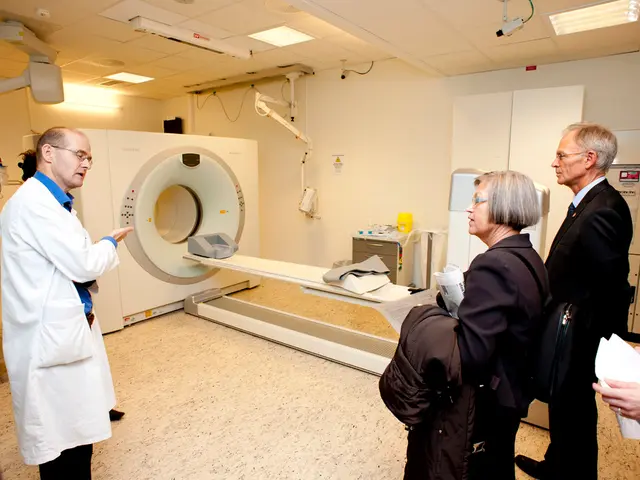Heart attack recovery and sexual activity: Guidelines, cautions, and advantages
After suffering a heart attack, many people may wonder when it's safe to resume their normal activities, including sexual activity. This article provides a comprehensive guide based on expert advice and scientific research.
Generally, it's recommended that people can resume activities requiring a certain level of exertion, such as climbing two sets of stairs, without experiencing symptoms, before having sex. The recommended time to resume sexual activity after a heart attack is around two weeks, but this can vary greatly depending on the individual's recovery, overall heart function, and symptoms.
Physical capacity plays a significant role in this decision. If a person can climb stairs or perform similar moderate exertion without fatigue or shortness of breath, they may be ready to resume sexual activity. Absence of warning symptoms, such as chest pain, palpitations, dizziness, severe fatigue, or breathing difficulties, is also crucial.
The type of heart event and treatment also influences the decision. For instance, after a cardiac arrest, doctors often recommend abstaining from sex for at least two weeks. The overall cardiovascular health and exercise tolerance are also factors that cardiologists consider when guiding activity resumption.
Avoidance of risk factors is essential. This includes avoiding the use of drugs that induce arousal (e.g., Viagra), excessive alcohol, and strenuous or unusual sex positions. Close monitoring is necessary, and patients and partners should watch for any warning signs and seek immediate medical help if symptoms like chest pain or severe breathlessness occur during or after sexual activity.
A long-term study suggests that resuming or maintaining sexual activity within 3 to 6 months after a heart attack is common and linked to better outcomes in heart attack survivors under 65 years old. However, resumption should always be individualized and based on cardiac rehabilitation progress and physician advice.
Speaking with a sex counselor or therapist may help resolve sexual issues related to mental well-being. Discussing any side effects relating to sexual function with a doctor may lead to dosage adjustments or alternative medication suggestions.
It's important to note that heart disease may cause lack of blood flow to the genital area, resulting in reduced arousal, difficulty reaching orgasm, and painful sex. Using lubricants and treating vaginal dryness may help. Having sex before taking blood pressure medications may prevent sexual dysfunction.
Some erectile dysfunction medications may interfere with certain drugs for heart conditions, and taking them within 48 hours of any nitrate medication can cause a dangerous drop in blood pressure. People should not stop taking any medication for a heart condition without consulting a doctor.
Recovery from a heart attack may take a few weeks for most people to resume their usual sexual activity. The time frame for resuming sexual activity may vary for each person, depending on their symptoms and whether they have a heart condition.
People who have undergone chest surgery will need to wait until their breastbone has fully healed before having sex, which can take 4-6 weeks. After open heart surgery, people may want to avoid sexual positions that put pressure on the chest area and opt for less active positions such as missionary or sitting positions.
Anxiety, depression, and other mental health conditions can affect sexual function. Regular physical exercise or cardiac rehabilitation is recommended to reduce the risk of a heart attack during sexual activity, which is rare.
In summary, resuming sexual activity is generally safe after about two weeks post-heart attack if the patient is symptom-free and capable of moderate exertion, with cardiologist approval and careful monitoring for any warning signs. It's always best to speak with a cardiologist to determine when it's safe for an individual to have sex after experiencing a heart attack.
- The recommended time for resuming sexual activity after a heart attack is typically around two weeks, but it can vary depending on the individual's recovery, overall heart function, and symptoms.
- A significant factor in determining when to resume sexual activity is a person's ability to perform moderate exertion, such as climbing stairs, without experiencing fatigue or shortness of breath.
- The type of heart event and treatment also plays a crucial role in the decision to resume sexual activity, with some heart conditions and treatments requiring a longer wait, such as after a cardiac arrest.
- Mental health conditions like anxiety and depression can also impact sexual function, and seeking help from a sex counselor or therapist may be beneficial in resolving such issues.




